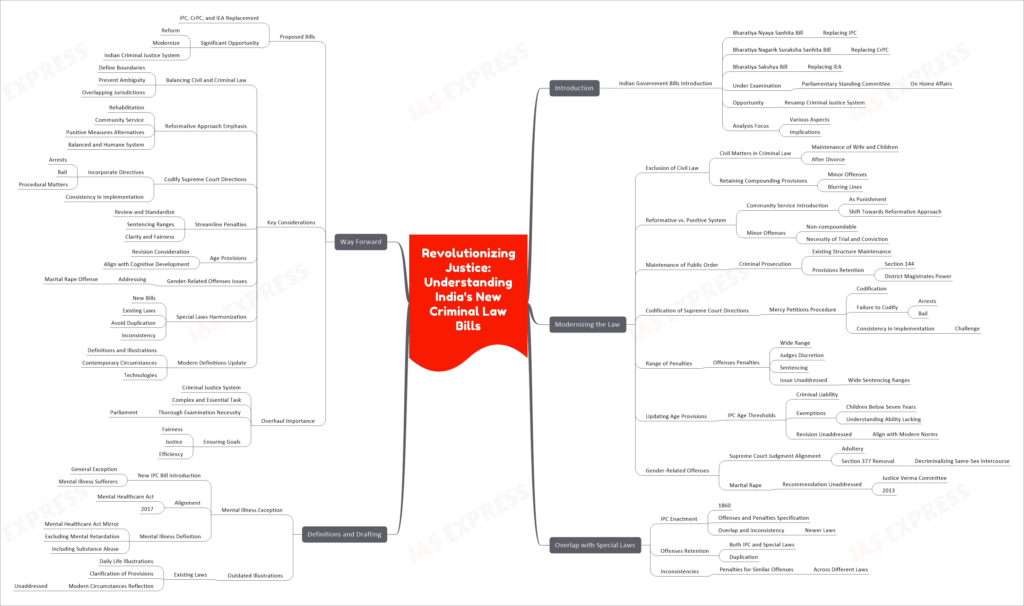Revolutionizing Justice: Understanding India’s New Criminal Law Bills
This topic of “Revolutionizing Justice: Understanding India’s New Criminal Law Bills” is important from the perspective of the UPSC IAS Examination, which falls under General Studies Portion.
Introduction
In recent news, the Indian government has introduced three Bills aimed at replacing the core laws that form the foundation of the criminal justice system in India. These bills, known as the Bharatiya Nyaya Sanhita Bill (replacing the IPC), the Bharatiya Nagarik Suraksha Sanhita Bill (replacing the CrPC), and the Bharatiya Sakshya Bill (replacing the IEA), are currently under examination by the Parliamentary Standing Committee on Home Affairs. This development presents an opportunity to revamp the existing laws that underlie the criminal justice system. In this comprehensive analysis, we will delve into various aspects and implications of these bills.
Modernizing the Law
Exclusion of Civil Law
- The inclusion of civil matters in criminal law, such as maintenance of wife and children after divorce, raises questions about the scope of these bills.
- Retaining provisions for compounding minor offenses blurs the line between criminal and civil matters.
Reformative vs. Punitive System
- The bills introduce community service as a form of punishment, signaling a shift towards a more reformative approach.
- However, certain minor offenses remain non-compoundable, necessitating trial and conviction.
Maintenance of Public Order and Criminal Prosecution
- The bills maintain the existing structure that combines provisions for maintaining public order and criminal prosecution.
- Provisions like Section 144, granting district magistrates power to impose restrictions, are retained.
Codification of Supreme Court Directions
- The bills codify the procedure for mercy petitions but fail to codify various Supreme Court directions related to arrests and bail.
- The need to ensure consistency in implementation remains a challenge.
Range of Penalties
- Penalties for offenses often specify a wide range, giving judges discretion in sentencing.
- The bills do not address the issue of wide sentencing ranges for certain offenses.
Updating Age Provisions
- The IPC specifies age thresholds for criminal liability, with exemptions for children below seven years and those unable to understand their actions.
- The bills do not address whether these age thresholds should be revised to align with modern norms.
Gender-Related Offenses
- The bills align with the Supreme Court’s judgment on adultery, removing Section 377, which decriminalized same-sex intercourse.
- The recommendation to make marital rape an offense, as suggested by the Justice Verma Committee in 2013, remains unaddressed.
Overlap with Special Laws
- The IPC, enacted in 1860, continues to specify offenses and penalties, resulting in overlap and inconsistency with newer laws.
- The bills retain some offenses covered by both the IPC and special laws, leading to duplication.
- Inconsistencies exist in penalties for similar offenses across different laws.
Definitions and Drafting
Mental Illness Exception
- The new IPC bill introduces a general exception for persons suffering from mental illness, aligning with the Mental Healthcare Act, 2017.
- The definition of mental illness mirrors that of the Mental Healthcare Act, excluding mental retardation but including substance abuse.
Outdated Illustrations
- The existing laws contain outdated illustrations from daily life to clarify provisions.
- The bills do not update these illustrations to reflect modern circumstances.
Way Forward
The proposed bills to replace the IPC, CrPC, and IEA offer a significant opportunity to reform and modernize India’s criminal justice system. To ensure these changes result in a fair, just, and efficient system, several key considerations must be addressed:
- Balancing Civil and Criminal Law: Clearly define the boundaries between civil and criminal law to prevent ambiguity and overlapping jurisdictions.
- Reformative Approach: Emphasize rehabilitation and community service as alternatives to punitive measures for certain offenses, promoting a more balanced and humane system.
- Codify Supreme Court Directions: Incorporate Supreme Court directives related to arrests, bail, and other procedural matters to ensure consistency in implementation.
- Streamline Penalties: Review and standardize sentencing ranges to provide more clarity and fairness in criminal proceedings.
- Age Provisions: Consider revising age thresholds for criminal liability to align with contemporary understanding of cognitive development.
- Gender-Related Offenses: Address issues related to gender-related offenses, including the recommendation to make marital rape an offense.
- Special Laws: Harmonize the new bills with existing special laws to avoid duplication and inconsistency.
- Modern Definitions: Update definitions and illustrations in the laws to reflect contemporary circumstances and technologies.
The overhaul of the criminal justice system is a complex and essential task. It is imperative that these bills are examined thoroughly by Parliament to ensure they meet the goals of fairness, justice, and efficiency in the Indian criminal justice system.
Practice Question for Mains
Discuss the key issues and challenges associated with the proposed bills aimed at replacing the Indian Penal Code (IPC), the Code of Criminal Procedure (CrPC), and the Indian Evidence Act (IEA). Analyze the implications of these bills on the modernization of the criminal justice system in India. (250 words)


